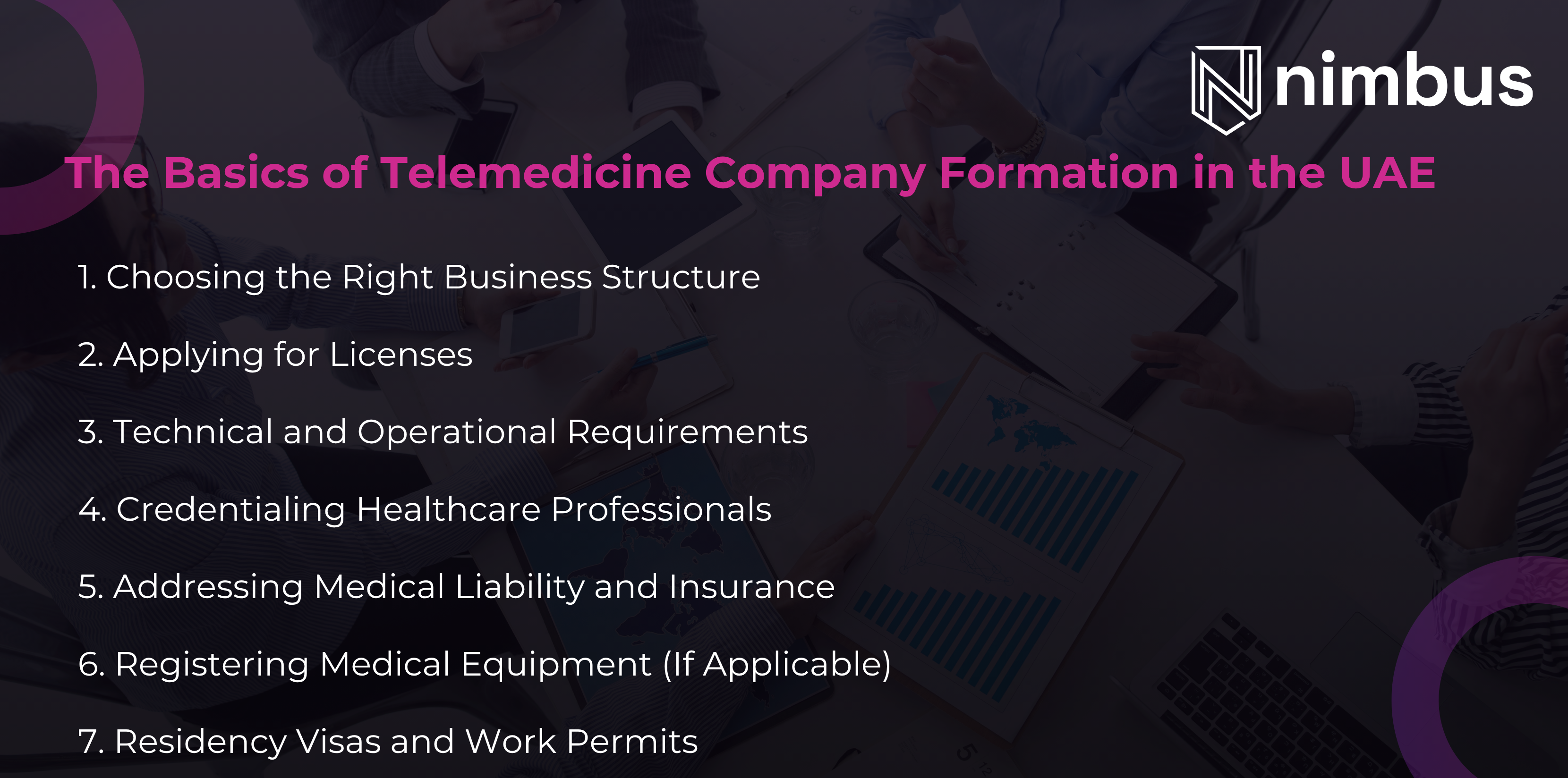The UAE has rapidly emerged as a regional leader in healthcare innovation, with telemedicine at the forefront of its digital transformation. Government initiatives, such as the Dubai Health Strategy 2021–2026 and high healthcare standards have contributed this sector’s growth.
If you’re considering entering the UAE’s telemedicine market, you’re tapping into an industry projected to grow from USD 29.9 million in 2019 to USD 536.5 million by 2025. However, navigating this opportunity also means dealing with a complex web of legal, operational, and regulatory requirements.
This blog outlines the key legal steps and considerations required for a fully compliant telemedicine business setup in the UAE in 2025.
The Basics of Telemedicine Company Formation in the UAE

1. Choosing the Right Business Structure
The first decision when launching a telemedicine company in the UAE is selecting the most appropriate legal structure for your operations. Investors can choose between two primary options: setting up on the mainland or in a free zone.
– Mainland Setup: Licensed by the Department of Economic Development (DED), this setup allows businesses to operate throughout the UAE and engage with both government and private clients. It is ideal for providers looking for broad market access.
– Free Zone Setup: Free zones like Dubai Healthcare City (DHCC) offer tailored infrastructure for healthcare businesses and allow 100% foreign ownership. DHCC is a popular jurisdiction due to its established regulations for health services and its support ecosystem.
The choice between mainland and free zone setups depends on your business goals, target clientele, and desired reach within the UAE.
2. Applying for Licenses
To operate legally, a telemedicine company must obtain the necessary healthcare and business licenses. The specific authority you need to work with depends on the emirate in which you intend to operate.
- Ministry of Health and Prevention (MOHAP): Oversees healthcare facilities in the Northern Emirates. Telehealth providers must comply with MOHAP’s Federal Telehealth Regulations.
- Department of Health Abu Dhabi (DOH): All facilities in Abu Dhabi offering telehealth services must be licensed by the DOH. Stand-alone telemedicine companies cannot offer tele-diagnostic or tele-intervention services unless contracted with a DOH-licensed facility.
- Dubai Health Authority (DHA): Regulates telemedicine services in Dubai. DHA-licensed facilities must meet specific Telehealth Service Standards.
- Dubai Healthcare City Authority (DHCC): Has its own regulatory framework, including the Healthcare Data Protection Regulation No. 7 of 2013, which governs patient data and consent.
To secure a license, you will need to submit a comprehensive business plan, validate professional credentials, and provide evidence that your technical infrastructure meets regulatory standards.
3. Technical and Operational Requirements
Running a telemedicine company involves more than offering virtual consultations. You must comply with strict standards to ensure patient safety, secure data handling, and reliable service delivery.
- Technology Requirements: Only clinically approved, assistive technologies are allowed. Autonomous systems replacing human judgment are prohibited. Your software must meet MOHAP-recognized certifications.
- Data Protection: Patient data must be stored on servers physically located within the UAE. The use of secure internet protocols and restricted access policies is mandatory. Regulations from authorities like DHCC and DOH require adherence to stringent privacy controls.
- Patient Consent: You must obtain clear and informed consent from patients. In most cases, this includes audio/video recording consent. Some jurisdictions, like Abu Dhabi, accept verbal consent provided it is properly recorded in the patient’s medical record.
- Language and Accessibility: Telemonitoring services must be delivered in Arabic and/or English, be integrated with electronic medical records, and be available on a 24/7 basis through qualified personnel.
4. Credentialing Healthcare Professionals
Healthcare providers working for your telemedicine company do not need a separate telemedicine license but must be credentialed by a licensed healthcare facility.
- Facilities must verify the skills, training, and telehealth competencies of each provider.
- DHA and DOH require facilities to ensure continuous training and professional development.
- If your business employs foreign practitioners, they must operate under the supervision of UAE-licensed healthcare professionals. Services must be provided in accordance with local medical liability laws.
5. Addressing Medical Liability and Insurance
Medical liability laws in the UAE are still evolving in the telehealth context. In general, liability rests with the healthcare facility where the telemedicine service is anchored.
- Legal Framework: Governed by Federal Law No. 10 of 2008 and Cabinet Decision No. 33 of 2009, the law does not yet fully cover cross-border practitioner liability, creating potential ambiguity for international companies.
- Risk Management: Implementing robust internal policies, staff training, and defined telehealth procedures can mitigate legal exposure.
- Insurance Coverage: Many UAE insurers now recognize telemedicine as a reimbursable service. However, reimbursement policies vary, so engaging early with insurance providers is essential to integrate your services into their coverage networks.
6. Registering Medical Equipment (If Applicable)
If your telemedicine platform includes medical devices like wearable monitors or diagnostic tools, these must be registered with MOHAP before use.
- Submit documentation covering device specifications, certifications, and safety standards.
- Ensure devices comply with UAE medical equipment regulations.
- Nimbus Consultancy can support the documentation and registration process to ensure a timely and compliant launch.
7. Residency Visas and Work Permits
To operate legally in the UAE, your company must secure the appropriate visas and work permits for staff members.
- Free Zone Operations: Jurisdictions like DHCC offer streamlined visa services, making it easier to bring in foreign expertise.
- Mainland Operations: You’ll need to work closely with the Department of Economic Development (DED), immigration authorities, and relevant health authorities to secure permits.
Delays or errors in this area can halt your operations, so expert support is highly recommended.
Why Expert Guidance Matters?
Going for a telemedicine business setup in the UAE represents a significant opportunity, but one that comes with multiple layers of legal, regulatory, and operational considerations.
From selecting the right jurisdiction and legal structure to understanding technical requirements, data protection laws, and licensing nuances, the process can be daunting.
Closing the Seal with Company Formation in the UAE
Telemedicine in the UAE is on the rise, driven by strong demand, government support, and increasing expat population. However, success in this sector depends on more than just a good business model. You must navigate an intricate system of health authority approvals, technical standards, and compliance obligations.
By following the right steps and engaging expert consultation, your telemedicine company can launch successfully and contribute meaningfully to the UAE’s future-ready healthcare ecosystem.



